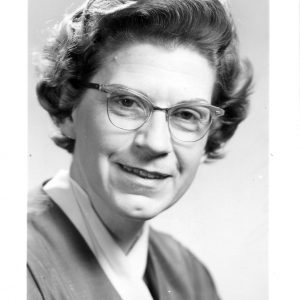The Pearl J. Aldrich Endowment in Aging Related Research and Education
Call for Proposals, 2025
Faculty Award Info | Graduate Student Award Info | Application Form
The Pearl J. Aldrich Endowment in Gerontology was created through an estate gift by Pearl Jackson Aldrich, PhD, who passed away in 1997. Dr. Aldrich was a long-standing faculty member who devoted nearly 36 years to MSU’s Department of Family Ecology before retiring as a professor and associate dean for research in 1978.
Dr. Aldrich earned her bachelors and masters degrees from Purdue University and her PhD in nutrition from Iowa State College. She became the head of the Food Services Laboratory at the Michigan State College (University) and published numerous journal articles in the area of food research. During her lifetime, Dr. Aldrich was especially committed to encouraging interdisciplinary approaches to discovering new knowledge in the field of gerontology and/or applying such knowledge to improve the lives of older adults.
Dr. Aldrich established this fund in 1989 in appreciation for the assistance and opportunities made available to her in pursuing educational challenges throughout her own professional career.
The Pearl Aldrich Graduate Student and Faculty Research Awards are funded by the Pearl J. Aldrich Endowment in Aging Related Research and Education. These one-year awards are competitive and intended to support Michigan State University graduate students and faculty who are committed to or strongly considering a career in a discipline that relates to aging. Awards may be used to support new research initiatives or ongoing projects that have a clearly identifiable focus that relates to gerontology or geriatric medicine.
The Research Project
The project proposal should address a research question that has unambiguous relevance to the field of gerontology, the study of the aging processes and individuals as they grow from middle age through later life, or geriatrics, a medical subspecialty devoted to the comprehensive health care of older persons and the well-being of their caregivers. Quantitative and qualitative research proposals may be submitted that utilize descriptive, correlational, experimental, and quasi-experimental study designs. Intercollegiate, collaborative, and interdisciplinary research proposals are given special consideration, as are applications that have a strong likelihood of obtaining future extramural funding. The scope of the project should be appropriate for completion in one-year as carry-over funding is not available for this award. Re-submissions of previously funded Aldrich proposals are permitted, to complete unfinished work, however re-submitted proposals are not necessarily given a higher priority for funding.
Graduate Student Applicant Eligibility
- All Michigan State University graduate students enrolled full-time at MSU (e.g., Masters and Doctoral degree students/candidates), medical students enrolled at MSU, and residents/fellows in training programs affiliated with MSU.
- Each applicant must identify a faculty mentor (not necessarily a gerontologist) who is preferably within their program.
- Priority will be given to applicants who show demonstrated scholarship potential and a commitment to a career in an aging discipline.
Criteria to be Considered in Selection of Graduate Student Awardees
- Importance of the research area to advancing the field of gerontology or geriatric medicine
- Quality and feasibility of the research project
- Evidence of the investigator’s commitment to the project
- Evidence of the investigator’s commitment to a career in a discipline that relates to aging
- Evidence of research mentorship and mentor commitment to the applicant’s professional development as an aging scholar
- Extent of the mentor’s ability to facilitate the completion of the research project and the applicant’s development of research skill.
Faculty Applicant Eligibility
- All Michigan State University faculty are eligible except for current members of the Pearl J. Aldrich Endowment Advisory Committee. This category applies to salaried or volunteer employees of Michigan State University or its affiliated institutions holding a prefixed or non-prefixed academic rank of assistant, associate, or full professor. Community-based faculty with an MSU appointment are eligible to apply. Research specialists employed by MSU are not eligible.
Criteria to be Considered in Selection of Faculty Awardees
- Importance of the research area to advancing the field of gerontology or geriatric medicine
- Quality and feasibility of the research project
- Evidence of the investigator’s commitment to the project
- Intercollegiate, collaborative, or interdisciplinary research activity
- Nature and extent of involvement of investigator in prior aging research activities
- Evidence of the investigator’s commitment to academic and professional development in gerontology or geriatric medicine
- Probability of future external funding to continue research endeavors.
Selection Process
Each application (due by 11:59 PM on May 30, 2025) will be initially reviewed by two members of the Advisory Committee. Applications deemed complete will be presented during the Advisory Committee Meeting in June for award selection. The awardees will be notified by June 20, with awards effective July 1.
Contact Information
All questions regarding the Pearl Aldrich Graduate Student and Faculty Research Awards may be directed to Joan Ilardo, PhD, Advisory Committee Chairperson.



